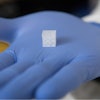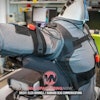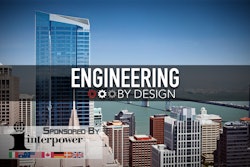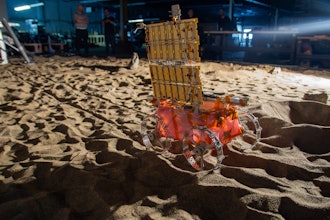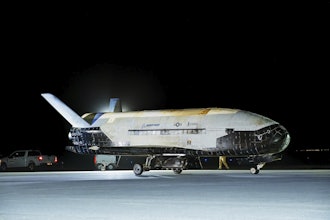This is Cubimorph, a prototype of a shape-changing interactive mobile device. Imagine that these modular cubes would align themselves into a flat rectangle when you need to use the device as a phone, but when you're looking to unwind, the same device would transform itself into a game controller.
The research comes out of the University of Bristol, which worked with Purdue, Lancaster and Sussex on the tech which was presented at the International Conference on Robotics and Automation in Sweden this week.
Cubimorph has a touchscreen on each of its six faces, and it uses a hinge-mounted turntable mechanism that reconfigures itself in the user's hand.
While Cubimorph is the first step towards a real modular interactive device, the researchers have a long road ahead of them before we’ll get our hands on them. Either way, this is sure to stir up interest in the human/computer interaction and robotics communities.
Desktop Thermoforming on Your Kitchen Table
Three weeks ago, researchers at ETH Zurich and Disney Research developed a new digital fabrication method they called Computational Thermoforming, and it looked like it could disrupt color 3D printing in the manufacturing space.
One week later, Mayku Industries launched the FormBox on crowdfunding website Kickstarter. FormBox is a similar digital fabrication method, only this one uses your vacuum cleaner to power a device that could disrupt color 3D printing in the consumer space – all on your kitchen table.
FormBox has since raised half a million dollars, nearly ten times what they were looking for to start up, via 1,300 backers. And they project still has 14 days to go.
Mayku wants to democratize manufacturing, and they see FormBox as the first phase in an effort to make smaller, simplified versions of machines typically used in a factory.
For as little as $349, you'll receive the FormBox and a starter kit that includes forming and casting materials.
And rather than challenging the consumer 3D printing space, the creators see Mayku as a way to take your 3D printed designs, and essentially create a small-run manufacturing facility, all on your kitchen table.
HP Lifts a Car with a 3D-Printed Chainlink
Two days ago, HP stole the show, well at least the first day of RAPID, one of the biggest additive manufacturing events in the world.
The company unveiled the HP Jet Fusion 3D Printing Solution. It’s a commercial product that is not only based on an open platform, but one that can print high quality parts up to 10x faster than current 3D print systems. And all at half the cost, according to the company.
HP's printer builds parts at the voxel level – that’s the 3D equivalent of printing 2D pixels in old-school printing.
The initial release includes two printers; the 3200, which prints 3500 cm3/hour in 0.08 to 0.10 mm layers; and the 4200, which prints 4500 cm3/hour in 0.07 to 0.12 mm layers. All of this is done in 1200 dpi print resolution.
The launch also includes a toolset with intuitive software, a new processing station with fast cooling, and high-quality materials.
To prove the new capabilities, HP printed a chain link in less than 30 minutes -- which for its size is pretty remarkable. The link weighs about a quarter of a pound, and it can lift up to 10,000 pounds. In a bit of marketing ingenuity, HP displayed the chain link’s capabilities by lifting a 95 Toyota Avalon - which was supposedly owned by the designer who created the part.
The 3200 printer - still don't know why it's called the 3200 even though it prints 3500 - starts at $130,000 and will be available in 2017. The 4200 is targeted for late 2016.
